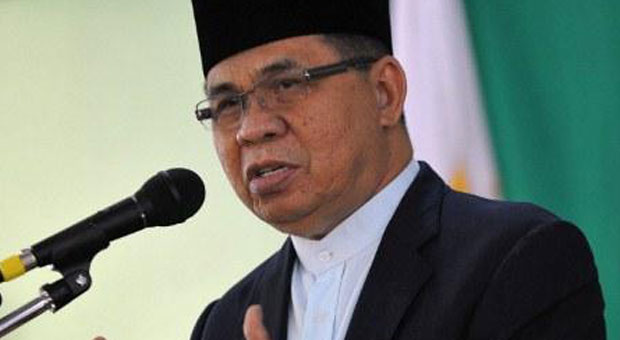One struggle.
This was the message of the Moro Islamic Liberation Front (MILF) to the Bangsamoro Islamic Freedom Fighters (BIFF) in asking the breakaway group to support the peace process with the government after the death of its leader, Ameril Umra Kato, last week.
It was also apparently a move by the MILF to end the fighting between the military and the BIFF, as MILF chief Murad Ebrahim said the group’s peace panel could work for a ceasefire should the BIFF consider rejoining the MILF.
The invitation was part of the letter of condolence sent by the MILF leadership to the BIFF after Kato died on April 14 from a heart attack.
Murad signed the one-page letter, dated April 15, a copy of which was obtained by the Inquirer on Saturday.
Both the MILF and the government are striving to save the peace agreement they signed last year after nearly 20 years of negotiations.
The peace process, and the proposed Bangsamoro Basic Law (BBL), came under attack from legislators and the public following the deaths of 44 police commandos and Moro rebels in Mamasapano, Maguindanao province, on Jan. 25.
READ: Full report: The Mamasapano incident
Brotherhood in Islam
“At this juncture, as one brotherhood in Islam and the need for one struggle, the MILF calls upon the leaders of the [Bangsamoro Islamic Freedom Movement]/BIFF to return to the fold of the MILF and support the ongoing peace process and the passage of the BBL as the final solution to the centuries-old Bangsamoro Question and conflict in Mindanao,” Murad said.
“Rest assured that [the] MILF and its peace panel will do everything possible so that all of you will be covered by the protocols of the [government]-MILF peace process, including the ceasefire,” Murad added.
The BIFF is smaller than the MILF, but as an armed organization it has managed to wage its own war against the government since 2008.
A ceasefire is in effect only between the government forces and the MILF. The truce does not cover other armed groups like the BIFF in Mindanao.
Under Kato’s leadership, the BIFF rejected the MILF’s decision to talk peace with the government and continued to fight for a separate Muslim state in Mindanao.
Kato used to head the 105th Base Command of the MILF until he and two other commanders broke away from the MILF after the Supreme Court declared unconstitutional a Moro homeland deal between the administration of then President Gloria Macapagal-Arroyo and the MILF in 2008.
Kato, his cousin Wahid Tundok and Aleem Sulayman Pangalian led their MILF units in bloody attacks in North Cotabato and Lanao del Norte in August 2008, soon after the Supreme Court decision.
Tundok and Pangalian eventually returned to the MILF, and have remained with the organization.
Offensive against BIFF
With considerable assistance from the MILF, the military and the police last month launched an offensive against the BIFF in Maguindanao and North Cotabato to flush out Filipino terrorist Basit Usman and his Malaysian associate Amin Baco who escaped from the Jan. 25 Special Action Force (SAF) counterterrorism operation in Mamasapano.
The SAF killed Malaysian terrorist Zulkifli bin Hir, alias “Marwan,” in that operation that went terribly wrong when the commandos got into clashes with BIFF and MILF guerrillas and armed residents of Mamasapano.
Forty-four SAF commandos, 17 MILF rebels and three civilians were killed in the daylong gun battle.
The deaths of the commandos sparked a public outcry for justice and opposition to the BBL in Congress.
But cooperation between the government and the MILF continued, with the rebels clearing the way for government troops to launch the operation against the BIFF.
The military offensive against the BIFF, however, resulted in the displacement of 95,000 people in Maguindanao, according to the grassroots group Mindanao Peoples’ Caucus.
Red Cross statement
In a statement issued Saturday, the International Committee of the Red Cross (ICRC) said civilians continued to suffer from the fighting in Central Mindanao.
“Although the fighting in Maguindanao has stopped, irregular skirmishes and uncertainty in the area prevent displaced families from returning to their homes,” Pascal Mauchle, head of the ICRC delegation in the Philippines, said in the statement.
Adding to the evacuees’ woes is the drought brought by El Niño, making the displaced families dependent on aid, Mauchle said.
“The prolonged dry season has increased the vulnerability of the displaced families, in terms of their livelihood and health. Each day in these temporary sites is a major struggle for them, and the future remains unclear,” Mauchle said.
RELATED STORIES
Mamasapano clash: What happened according to the military
Aquino claims responsibility for Mamasapano tragedy
20 senators sign report holding Aquino responsible for Mamasapano
